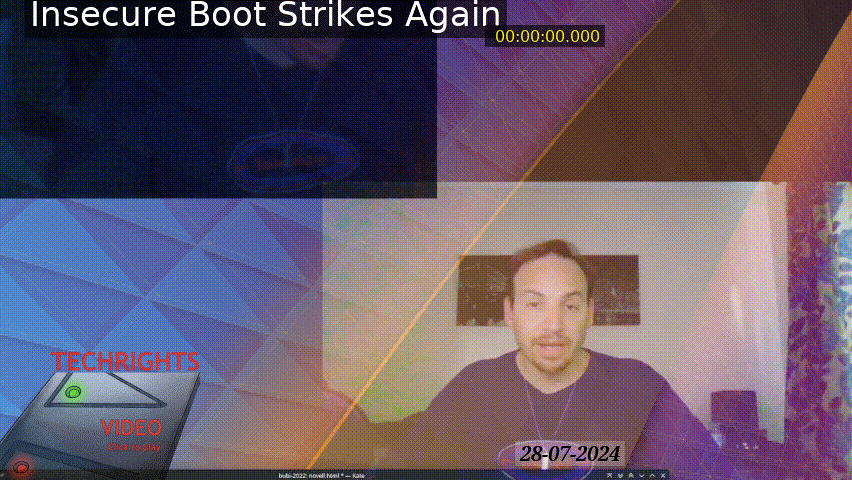[Video] UEFI Insecure Boot: Another Nail in the Coffin
Video download link | md5sum dd9c634b1416f67902406317d73b9009
Insecure Boot Strikes Again
Creative Commons Attribution-No Derivative Works 4.0
THE small bunch (borderline fringe) of 'Secure Boot' Microsofters are not talking about the latest blunder. They just have nothing to say in their defence. They've been proven wrong. So let's discuss the matter. We don't just let it pass.
12 years ago they told us adoption of 'bootlocks' is fine and that this is perfectly OK. To oppose this would be to oppose security. Well, patience is a virtue here because over the past 12 years we've repeatedly been proven right and we can howl from rooftops now. The lesson is, do not believe anything Microsofters say. As an associate put it recently, there will "be a few long-form series later on in the indefinite future on the details."
The time seems right to respond to over a decade of mindless propaganda from Microsofters. They're hired professional censors in an effort to suppress information and intimidate women.
Some have dubbed this latest scandal "InSecure Boot" and security gurus are deeply concerned ("This isn’t good"). IDG said:
Security research firm Binarly reports that leaked cryptographic keys have compromised hardware from several major vendors in the PC industry, including Dell, Acer, Gigabyte, Supermicro, and even Intel. Eight percent of firmware images released in the last four years are compromised, with 22 untrusted keys discovered immediately.
This is also discussed in some GNU/Linux forums. One commenter said: "It's security done by Microsoft... that's all that needs to be said, eh?" Another one said: "Yeah, enough said. I'm grateful that I was able to switch off secure boot on my new T14 Thinkpad to install Linux. I'm glad that Windows isn't on my home LAN."
This additional report says "Secure Boot key compromised in 2022 is still in use in over 200 models — an additional 300 more use keys are marked ‘DO NOT TRUST’". To quote from the summary:
>Software security firm Binarly discovered that over 200 device models used a compromised security key, while an additional 300 more used default test keys shared with nearly all of AMI's customers.
Finally, for the time being, this one mentions another "brand name" for this issue:
A vulnerability dubbed PKfail can allow attackers to run malicious code during the boot process, which can be used to deliver UEFI bootkits.
No matter what one calls it - e.g. "PKfail" or "InSecure Boot" - this is a black eye to Microsofters.
We already added some of these stories to Daily Links or had them linked to the originals in the sister site, but on Saturday we did a video about it. The first piece that everyone linked to (also in IRC) was Ars Technica's and it sort of speaks for itself. An associate called for "a Tomi Ahonen style "I told you so" article," arguing that "even short series is warranted because the public had been warned in detail in advance of just these kinds of problems."
We've repeatedly written about this since 2012.
"There are other problems too which have manifested," the associate said, "this is not the first."
There are also more serious warnings (warranting further precautions) which have not yet come to pass, so the other shoe has yet to drop - so to speak - on UEFI.
The politics which the UEFI patches and shim allowed Microsoft can be re-examined in this context.
Microsoft is meanwhile pushing the media to pretend no option exists other than Windows (and Office) for new laptops and desktops. What is this, 2004? Citing this as an example, the associate said "Microsoft pursues trapping people into a the sunk cost fallacy to prevent upgrading the OS to Linux or, worse from their perspective, using open formats for documents."
The way Microsoft sees things, anything other than Windows is not trustworthy or is "piracy". People who object to Windows are being bullied and vilified, even if the facts are on their side all the time. █


